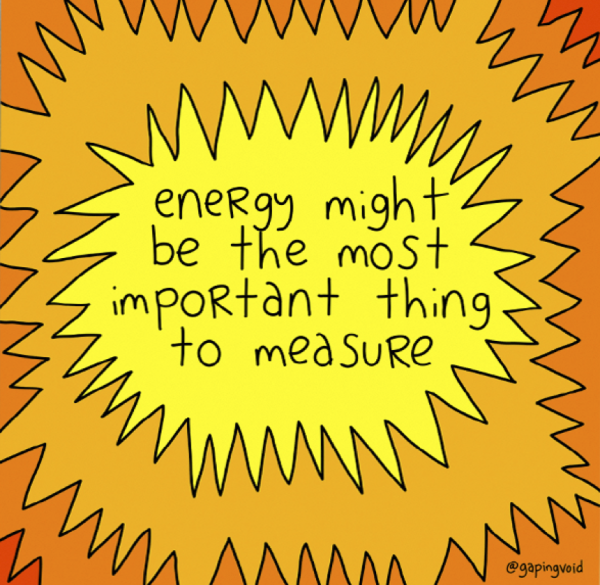Last week, we talked about the future of AI and the potential for AI to start taking over some jobs (freeing humans to raise their chins and do something better and more meaningful).
One of the key factors I talked about was "mindset." For example, consider whether you’re in a scarcity or abundance mindset? If you are in a scarcity mindset, that probably means you see life as a finite pie with only so many slices … and if someone else gets a big slice (or something new interrupts you getting your slice), you worry that you might not get what you deserve. On the other hand, an abundance mindset recognizes that there’s plenty out there for everybody, and if there’s no more pie, we can always create new pies (or something better).
I have a picture in my conference room that says energy might be the most important thing to measure.

via GapingVoid
Yes, it means what it sounds like – but, for us, it also means more.
We use A.I. to trade. So, measuring performance is important. But so are all sorts of production, efficiency, and effectiveness measures.
There are hundreds of important metrics we track day-to-day. Energy impacts many of them (and absolutely affects your ability to respond to change).
Energy affects how you feel, what you do, and what you make things mean. Consequently, energy is an effective way to measure your values too.
We’ve seen numerous inflection points in the past with the introduction of electricity, and then the assembly line and the industrial revolution, with the internet, and now with AI.
There’s always disruption, and there’s always pain, but your mindset and energy can radically change what that means to you … and what you choose to do.
AI is coming. Disruption is coming! It's no longer simply possible; it's not even just probable; it is inevitable. With that said, what you make it mean and how you respond is up to you.
In a prior post, I shared a mindset scorecard I created at Genius Network.
Normally, Genius Network is private, and these recordings are for internal use only; but I asked permission to share my impromptu session with you.
Check it out. In the first 5 minutes, I introduce the scorecard concept. For the next 10 minutes, you'll get an extra look at the resulting group discussion.
Think of each comparison as a spectrum. They're not necessarily "one-or-the-other," but they can help identify where you are on the scale of "what to avoid" versus "what you want."
- Blaming <—–> Encouraging
- Insistent <—–> Inspirational
- Fearful <—–> Abundant
- Steadfast <—–> Curious
- Clogging <—–> Cleansing
- Resentful <—–> Grateful
- Zero-Sum <—–> Relational
- Small-Minded <—–> Visionary
These words mean something to me, but they may need tooling to work for you. Changing the names, the order of the comparisons, the number of comparisons, etc., can have a profound effect on the usefulness of this scorecard to you.
I encourage you to think about how you could use this scorecard and how you can bring attention to those people and actions that best embody the traits that are important to you or your business.
Identifying the words you want to embody and the person you want to be can help make you responsive to change and a better version of yourself.
Hope that helps.

Leave a Reply